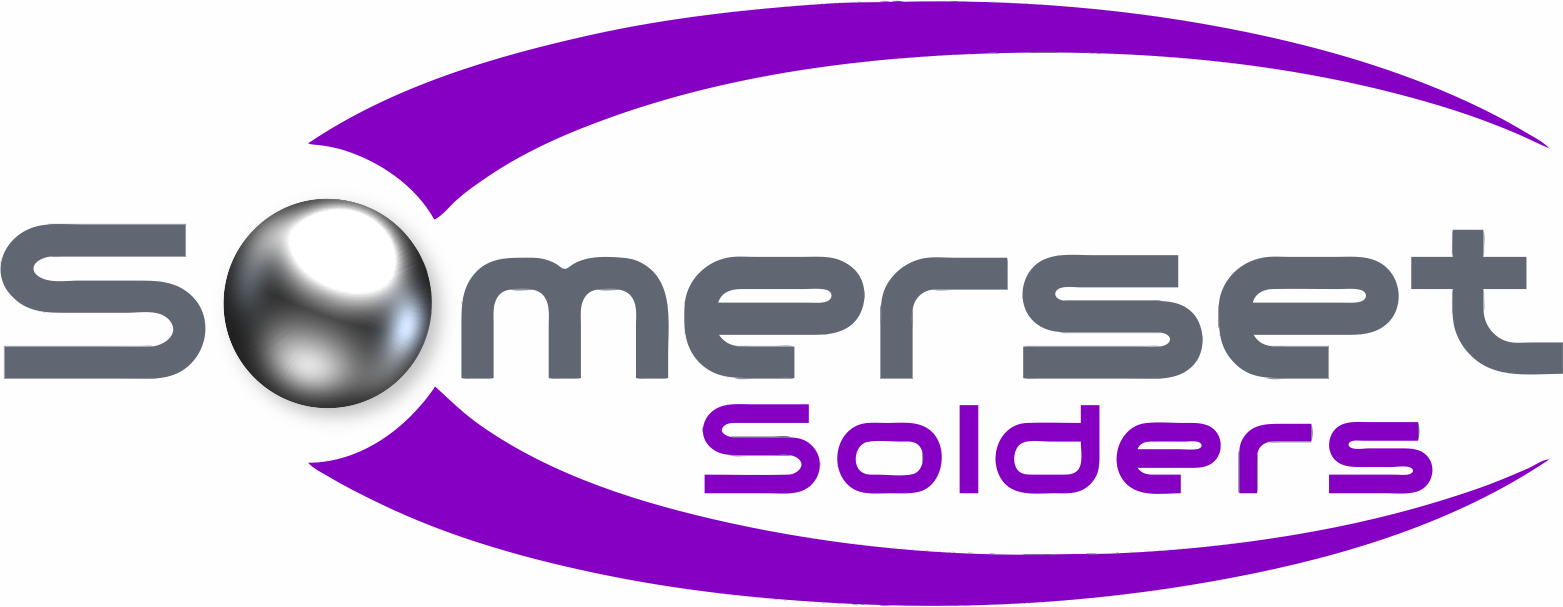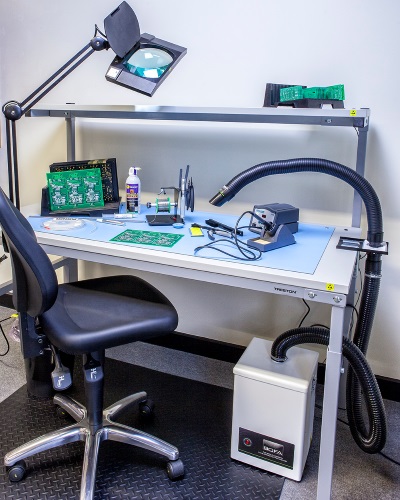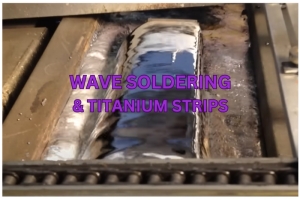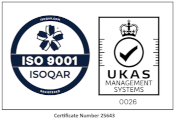
In this blog, we will cover the importance of fume extraction particularly during the hand-soldering processes involved in printed circuit board assembly. We will take the opportunity to relate to publications from HSE Health and Safety Executive and resources provided by BOFA International.
THE PAST - Maybe we all took certain aspects of health and safety too casually. Maybe you remember hand soldering and literally holding your breath to prevent breathing in the fumes? I'm sure I wasn't the only one!!!!
THE PRESENT - There are laws and regulations in the UK for employers to control exposure and to have in place protective measures to capture fumes generated during soldering. It is the duty of the employer to comply with the Health and Safety at Work Act 1974 (HASAW) and through the CoSHH Regulations 2002. It is also important that employees take steps to adequately protect themselves and colleagues at work. These are not meant as scare tactics but to ensure that the health of all in the workplace is always considered.
SOLDERING - The materials, the process, and subsequent fumes. Soldering is a means of joining one metal to another, using a solder alloy, flux, and heat. For the soldering of printed circuit boards (PCBs), generally, a solder wire with a flux core is used; when a heat source such as a soldering iron is introduced to the solder the flux is released to promote solder wetting of the surfaces, removing oxides and to aid in heat transfer. Flux chemistry can be broken down into three categories: Resin-based, Organic, and Inorganic. Solder alloys can be simply categorised as Leaded or Lead Free with the former containing a percentage of Lead. The flux chemistry, which can vary from solder manufacturer to manufacturer, can give rise to emissions of particulates and gases that will pass into the lungs and possibly directly into the bloodstream.
Metal and metal oxide particles - Lead is a known restricted substance (RoHS) within leaded solders; Lead-Free metal particles will be also emitted and mostly consist of Tin, Silver, and Copper.
Resin droplets - the most commonly used resin is rosin (colophony). This is a known carcinogenic and Rosin-based fumes are one of the most significant causes of occupational asthma in the UK.
Other contents in emissions - These can be different kinds of 'activators' added to increase chemical activity, such as an amine hydrohalide or acids such as salicylic acid, adipic acid, benzoic acid, and oleic acid. In highly active inorganic fluxed solders, inorganic halides such as zinc chloride and ammonium chloride are present, with hydrochloric acid being present.
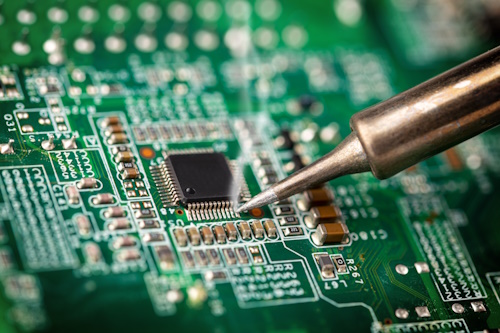
FUME EXTRACTION SYSTEMS FOR HAND SOLDERING
There are two types of methods of extraction to be considered - Tip Extraction or Volume Extraction. As a BOFA International distributor, I have shown examples of their available systems that tackle the removal of solder fume particulates at source, both safely and efficiently.
TIP EXTRACTION - This is a method of extraction at the point of the soldering iron tip and drawn through a small bore pipe and tube assembly to the extractor unit. By using the BOFA universal soldering iron kits A1090025 or the ESD version A1090026, the small bore extraction pipe can be positioned to draw the fumes away to be piped into a single-user system such as the small bench-top BOFA T1 system or the larger multi-user system the BOFA T15. This is a system that can handle up to 15 soldering irons and the small bore tubing is plumbed into 50mm rigid pipework which is ultimately connects to the main T15 unit. IMPORTANT - With the small bore soldering iron tip extraction method, one thing to be aware of is that the metal tube will slowly have a build-up of condensed flux which deposits during the process. A cleaning pipe brush is supplied and as part of a weekly maintenance plan the metal tube should be cleaned. If this is left to build up then the smaller internal diameter will reduce the effectiveness of the pump and airflow. An alternative method of cleaning the pipe is by soaking it in a saponifier cleaning solution which will break the flux residues down to a soap and then easily rinse it out with water.
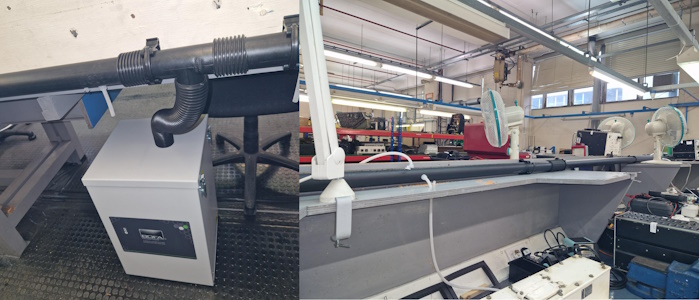
VOLUME (ARM) EXTRACTION - This form of extraction is performed by positioning a flexible arm in the vicinity of the soldering operation and fume generation. It offers potentially more options to be able to not just extract during hand soldering but also processes such as using a solder pot, pre-heater hot plates, potting, and working with adhesives.
An example of a simple setup using the single-arm system, the BOFA V 200 Single Arm System, is shown here. It offers portability with the main unit being able to be easily moved, and the arm mounting kit, being able to be side bench clamped or by a method of mounting the arm directly into the bench top.
VOLUME (ENCLOSURE) EXTRACTION - This is the ideal method of maximum capture capability and safety. By having a hood enclosure, the generated fumes are contained in the working area and drawn out to the extractor unit. A perfect method for the capture of fumes, vapours, and gas extraction during soldering, gluing, and conformal coating. This is the FumeCab 250 that connects via a 75mm flexible pipe to a BOFA V 250 unit. Details can be found at: https://www.somersetsolders.com/bofa-fumecab-250-and-v250
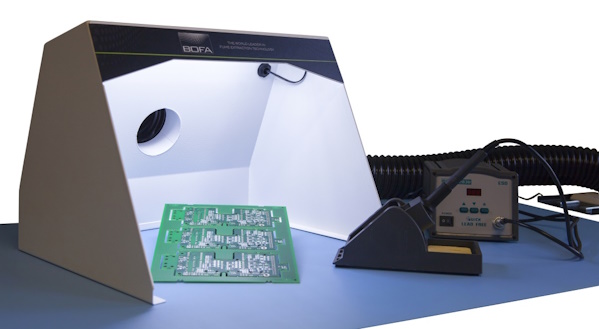
So the options of how to tackle solder fumes are there. Your preferred method may be down to practicality, space, and affordability but the need for extraction is a must.
FINALLY CONSIDER THE FOLLOWING:
1. Do you need to use a Lead-containing alloy solder wire?
2. Have you tried an alternative to a rosin (colophony) fluxed solder wire? (CONTACT US FOR SAMPLES)
3. Aim to keep the soldering iron tip clean by wiping off built-up overheated flux which will add to the amount of fumes.
4. Maintain your extraction to ensure the system is performing at its best. Check filters and pipework regularly.
5. Don't forget that there is a legal obligation to have your LEV equipment inspected and tested at a maximum of every 14 months.
REFERENCE:
HSE (Health and Safety Executive
Electronics (Soldering) - Where are the hazards? https://www.hse.gov.uk/lung-disease/electronics-soldering.htm
Clearing the air - A simple guide to buying and using local exhaust ventilation (LEV) https://www.hse.gov.uk/pubns/indg408.htm
Controlling airborne contaminants at work https://www.hse.gov.uk/pubns/books/hsg258.htm
THE FACT OF THE DAY - The word 'Flux' derives from the Latin fluxus meaning 'Flow'.

